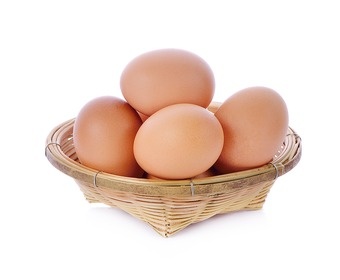
Choosing eggs
Eggs are different sizes. Small eggs weigh 43–53g, medium-sized eggs 53–63g, large eggs 63–73g. And then there are giant eggs weighing more than 73g that usually have a slightly thinner shell – because hens always produce the same amount of egg shell irrespective of the size of the egg.
Fresh eggs for desserts
It doesn’t matter if eggs you are going to hard boil and peel are a week or two old as it makes the membranes detach more easily from the shell. But when you’re making desserts, it’s usually worth choosing eggs that are as fresh as possible. This means the cook can make maximum use of the egg’s binding properties in sauces, mousses and custards.
You can work out the age of eggs in store by looking at the best-before date. Count back 28 days for the date it was laid.
Professionals weigh their eggs
Recipes often assume medium-sized eggs. But dessert chefs and pastry chefs get the scales out and weigh the egg yolk and egg white they need.
Eggs round off flavors and add lightness
Eggs are a fantastic ingredient in many ways. Besides binding together macaroons, the yolk rounds off the flavor of a chocolate mousse while the white makes a light and airy topping of Italian meringue or becomes the light, crisp finishing touch on Eton mess. But eggs are sensitive to temperature and can go horribly wrong. Practice, say the professionals.
Failure probably means you were using the wrong recipe. And that you haven’t learned anything.
– Kin Tsui, 39Wäst
Eggs bind other ingredients and bring them together
Eggs bind twice as much liquid as their own volume. Egg yolk contains lecithin, which works as a natural emulsifier, in other words, helps to blend liquids. Egg yolk can help the fat and water to combine when beating a pâte à bombe into a mousse.
About eggs and temperatures
- Egg white coagulates at 62–65°C.
- Egg yolk coagulates at 65–70°C.
- A “64-degree egg” is said to be the perfect consistency.
- Mechanical processing affects coagulation. When you keep the egg moving with a whisk, the egg mixture can be heated to 84°C without getting a chance to coagulate into small flakes, instead forming a gloriously fluffy result with the other ingredients.
- Eggs at room temperature are easier to beat for meringue.
Avoid cold eggs
When making desserts, it’s often important that the ingredients are at the same temperature when combined. It’s not usually the best idea to use eggs straight out of the fridge. You can keep them in the fridge if you like, but make sure you take them out ahead of time when cooking desserts.
Eggs for glazing
You get a deeper color and a more attractive surface on bread and buns baked in the oven if you add a little water to the beaten egg you use to glaze them.
Make your own meringues
If you’re starting to make classic desserts on a regular basis, you’ll notice you end up with quite a lot of egg white left over in the fridge. Use it to make your own meringues.
Remember they need a long time in the oven. But they keep well and are practical and effective as a decoration for everything from a scoop of sorbet to a banana split. Once you’ve got the hang of it, try adding a little melted chocolate to the mix. Stir in carefully, or barely at all, otherwise you’ll just get brown meringue. That tastes good too, but it isn’t as attractive.
Three sorts of meringue
There are three different kinds of meringue which differ slightly in the way they are made, their consistency and what they are best used for: French, Swiss and Italian.


